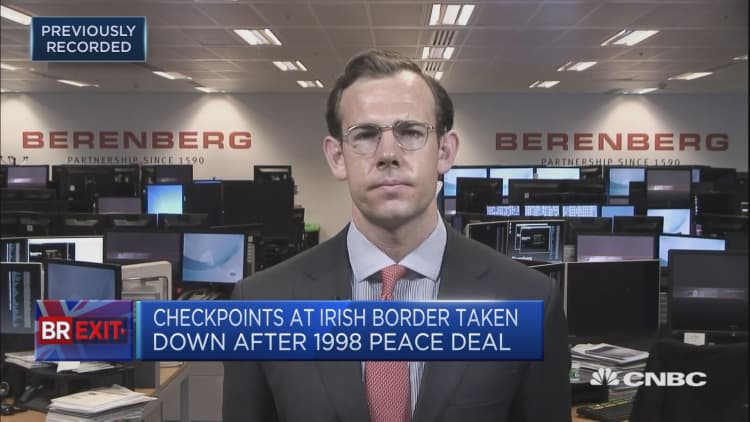Ireland’s Foreign Minister Simon Coveney suggested the U.K.’s negotiations over leaving Europe could be extended beyond 2019 as concerns grow that Britain and the EU might not reach an agreement before a legal deadline.
Brexit negotiators are racing against a cut-off date of March 29, 2019 — when the U.K. officially stops being a member of the European Union. They need to establish how the future relationship will work between both sides of the English Channel after that date. However, the politics and the complexity surrounding Brexit have made such a process hard to conclude, with many analysts currently wondering whether there will be any deal at all.
Speaking to the BBC’s “Today” radio show, Coveney said the Irish government would not oppose a U.K. request to extend Brexit negotiations.
"I don't believe Britain crashing out of the EU without any agreed process is likely to happen … There is an obligation on me, and others, to instill some positivity into this negotiation process rather than political standoffs which is what we've seen to date,” he said.
Despite being open to an extension in negotiations, Coveney added that this would only make sense if there were good reasons to believe that “a sensible agreement” would be reached during that extended period.
“An extension of the Brexit talks beyond March 2019 is legally possible, but requires the agreement of all 27 remaining EU member states as well as the U.K.,” Roger Matthews, a senior international trade lawyer at law firm Dechert LLP, told CNBC via email.
“The U.K. has so far been against countenancing making any such request, and a change to this position would be politically awkward; but the government may come around to seeing it as the least bad option,” he added.

For now, the aim is to conclude talks before at the least the end of this year to ensure that there is enough time for some European parliaments to approve the final deal between the U.K. and the EU.
So far, both sides have agreed that European law will continue to apply in U.K. territory until the end of 2020, to allow businesses and citizens to adapt to a post-Brexit context. However, such agreement is also dependent on the final outcome of the Brexit negotiations.
A spokesperson for the European Commission — the executive arm of the EU — wasn’t immediately available for comment when contacted by CNBC about a possible time extension for the negotiations.
May takes control
In an attempt to reinvigorate Brexit talks, which started in March last year, U.K. Prime Minister Theresa May said Tuesday she was taking personal control of the negotiations.
“It is essential that in navigating the U.K.'s exit from the European Union, the government is organized in the most effective way,” the prime minister told U.K. lawmakers.
“I will lead the negotiations with the European Union, with the Secretary of State for Exiting the European Union deputizing on my behalf,” she said.



